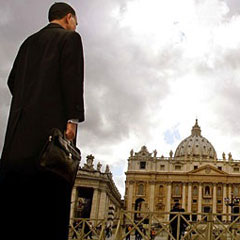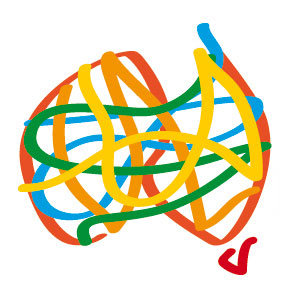Yesterday’s post about viewing The Triumph attracted the attention of the film’s director, Sean Bloomfield, who has invited feedback.
Today’s post is, therefore, something of an open letter to Sean. I hope others who have watched the film will not only comment, but also disagree with some of my observations. Without those corrections, this review will be deficient.
The Triumph is an excellent movie. I’m saying that at the outset because the rest of this review is quite critical, and I don’t want to obscure the fact that I liked the film very much. The thing is though, I think it can be even better, and it’s for that reason that I post these criticisms.
I think there are two different films in The Triumph, and each film is struggling to vie over the other. It’s hard to explain in writing, but fortunately, the point is illustrated by two trailers freely available online.
In one corner, we have a documentary film on the history and messages of the Medjugorje apparitions. It’s an okay documentary. It won’t change the minds of sceptics, but it will edify believers. It’s this documentary film which is promoted in the official trailer:
In the other corner, we have a film about a 28-year-old recovering addict and his conversion. It’s an engrossing and compelling story, well told. This is the film promoted in the opening two and half minutes of this video:
This is the film which impressed me most. It has the potential to profoundly impact people — especially young people — who are searching for meaning. I’d like to see this conversion story recut and liberated from the co-existing documentary film.
As it stands now, The Triumph is too long. It tries to do too much, and it doesn’t know its audience. As I watched the film, I asked myself again and again, how would the average secondary school student react to this part?
What follows are my suggestions on how to improve the film, so that it is focused squarely on a younger audience struggling to identify their place in the Divine Plan.
- Some of the early scenes situate Medjugorje within the political history of the Cold War, and later scenes evoke apocalyptic themes. These are peripheral to Ben’s story, so they’re the first things I’d cut. Honestly, I think anyone who is moved by this film will do their own research on Medjugorje post-viewing. The Triumph should limit itself to be an introduction to Medjugorje, not an exposition.
- The film is very good at portraying Medjugorje’s appeal to youth, but by shortening this section, it could be improved. I cringed at the Woodstock reference, and winced at the scenes of dancing nuns, etc. The audience around me loved this stuff — but it was an older audience. A younger audience, I think, would find it awkward. To a young person, that sort of spectacle is fun and funny when they and their friends are engaged in it, caught up in the moment. Watching from afar though, it’s just lame. On the other hand, the witness of local youth walking hours and hours to reach Medjugorje, and the interviews with young pilgrims, was very effective.
- The American priest, who knows Ben personally, is fantastic when he’s on message, speaking about humility, mercy, conversion, etc. He’s very funny when he jokes at his own expense and takes off annoying pilgrims, but he’s not so great when he takes off The Simpsons and SouthPark. Again, the cinema audience loved this, but I’m not sure a younger audience would. Since these jokes are peripheral to Ben’s story, they’re better left on the cutting room floor.
- Ben’s trip to the Cenacolo community is one of the film’s greatest moments, and his visit to the Orthodox monastery is good too. But his visit to the Islamic mosque is less compelling. The interviews with the local imam — the Muslim counterpart to Evelyn Waugh’s Modern Churchman apparently — is a disservice to Islam, and a disservice to the film.
My favourite parts of the film are the two penultimate chapters. Ben’s meeting with Mirjana is very powerful. I’m still undecided on the authenticity of Medjugorje, but I was very impressed with Mirjana. She speaks and acts with authority. It is manifestly evident that she has a deep interior life.
Even better is the exposition, as Ben is preparing to leave Medjugorje, on the love of God, the grace of conversion, the science of man’s search for meaning, the Triumph of the Immaculate Heart. This is pitch-perfect, as is the treatment of Ben’s post-Medjugorje exploits and subsequent discernment.
Let me repeat: The Triumph is an excellent film, which any Catholic would appreciate, whatever your stance on Medjugorje. Speaking personally, I’m determined now to visit the site of such beautiful conversions.
I hope my criticisms aren’t a discouragement to potential viewers. If you can see it, I suggest you do. If you have seen it, please tell me where I’m wrong in the comments below!






Great post Fr John. I think you have made some great points and I would agree with your critique. Having little time, I ended up watching the full movie after midnight and the 1hr45min took me until nearly 2am! The primary story was of Ben and his journey from addiction to hope. Our culture is a little different to that in the US and the trailers really reflect that by their style. I could have done without the references to the Simpsons and Southpark. Aren’t they shows young peoples’ parents watched? There were some great quotes from priests but the most powerful part of the movie for me was the Cenacolo Community.
I had a huge conversion experience at Medjugorje and have been twice. Through Medjugorje Our Lady drew me to her son, Jesus. My spiritual journey moved from praying rosaries to sitting in front of Jesus in the Blessed Sacrament. From there Jesus took me into a deeper relationship with God the Father. My spiritual journey still continues and the Holy Spirit now leads me into situations where I must completely rely and trust in God. I know Praise and Thank God for everything both good and bad so that God can come into every situation. And every so often, Our Lady reminds me that she is still there watching over me and drawing me into a closer relationship with the Holy Trinity. 🙂
I felt a little disheartened by your response. I have been to Medjugorje four times since 1989 and I have been in contact with Priests who were sceptical before going and came back believing in the Apparitions and messages of Our Blessed Mother..I have met people of all countries and even other faiths who have been impacted by Medjugorje. changed their lives for God,, found their vocation.in life as well as to the Priesthood. Medjugorje has saved lives, I would not have enough time or space to share all the good I have seen by the blessing of Our Lady Queen of Peace Appearing there. I have been totally committed for 23 years, and unless someone goes and experiences the beauty of Gods gift there.. I find there is such a lack of understanding.
Pope John Paul 11 ,s love of Medjugorje is evident in many of his letters to friends and encouragement to Bishops and Cardinals to go and also pray for him there. Also Cardinal Ruini is leading the Vatican commission in Rome on Medjugorje , unheard of in the Church whilst the apparitions are still occuring.. These are all such good signs. So many milllions find God.. Man coudlnt do this only Gods grace. I suggest people need to go and experience Medjugorje as it is very hard to convince anyone who hasnt been. I look forward to your pilgrimage to Medjugorje and hearing what you have to say after experiencing the grace of Our Lady Queen of Peace. In defense of the nuns dancing.. This is the Beatitude Community, and they relate so well to the youth. Recently.. 500 Priests and 50,000 youth were there. They are a wonderful prayful community.. and the youth do not laugh at them they laugh with the joy of the Holy Spirit and dance like David danced.
Every blessing and we have had wonderful feed back from youth who have seen the film.
Thank you for taking the time to post your observations on the film, Fr. John. The film was made on an almost non-existent budget, so even the fact that the film has reached you in Australia — and over 50,000 other people throughout the world — is itself a miracle.
I am thrilled that you now want to visit Medjugorje! You won’t be disappointed. Hopefully I will be there when you go and we can meet for a coffee — or, better yet, a rosary.
My only comment about your critique is that you may have misunderstood the “target audience,” which you alluded to but never really identified. It seems like you may think we were only trying to reach teenagers or the youth.
In Medjugorje, Our Lady says that she comes for all people… people of all ages, cultures, countries and even religions… to call all of us to conversion. Medjugorje is for everyone. Likewise, the target audience for The Triumph is, well, everyone.
It is a film for older people and younger people, and people in the middle. It’s a film for Catholics just as much as it is for people of other religions (although hopefully it will plant a seed in peoples’ hearts about the Catholic Church). I know that trying to make a film for such a broad audience is a risk, but I think the rewards outweigh the risk. As you said, the audience reacted positively to some of the things that didn’t appeal to you. And, overall, those things did not prevent you from calling it “an excellent film.” (Thank you, by the way!). So, ultimately, I feel like the film succeeds in that it has the potential to reach a very broad audience, which was the goal all along.
Thanks again, Father, and God bless!
In an ideal world, Sean, you would have the means to make a “Youth Group and High School Retreat” edition of The Triumph which would be shorter, sharper, and focused on that audience. The fact is, of course, that the world is not ideal, and what you have achieved on a low budget is remarkable.
The movie I reviewed — the “youth group” edition — exists only in my imagination. You are quite right to note that the movie you actually made — and the movie that I actually saw — is intended for a broader audience, and deliberately so. And it is, indeed, well done. I’m sure it has already borne a lot of fruit, and I pray it bears a lot more!
I agree with you Sean, conversion is for all people and for all age groups and all cultures.
Commentary from a secular Carmelite who lived in Medjugorje as a nun before and during the event.
http://te-deum.blogspot.com.au/2011/02/medjugorje-controversy.html
and …
http://www.catholicherald.co.uk/commentandblogs/2011/02/11/medjugorje-is-generating-what-the-devil-loves-most-disobedience/
Medj is a huge money-spinner. Anyone making money out of it is disqualified to comment.
Donal Foley’s Theotokos site has this homily from the Bishop Of Mostar in Medjugorje on the feast of Corpus Christi in 2001. First and foremost, it is the Ordinary of the diocese concerned who has the authority to pronounce on the events.
http://www.theotokos.org.uk/pages/unapprov/medjugor/bpperic4.html
As the facilitator for the Melbourne screenings I would like to make the following points to Fr John’s critique.
1. Early scenes of Medjugorje. This is to remind the audience that the visionary/seers were teenagers when Our Lady first started appearing to them in 1981, and Jakov was only 10 years old. It is children who have no mental blocks as even the visionaries of Fatima were children. Fr Ken Roberts from America used to always say- ‘Show me a place where I can take 10 coach loads of teenagers and young adults who have lapsed and no longer practise their faith and a week later they are returning spiritually renewed by the sacrament of reconciliation, attending daily Mass and praying rosaries and adoring Jesus in the Blessed Sacrament. The number of youth visiting Medjugorje –as exemplified by attendance at the annual youth festival in Medjugorje shown in the movie is of the order of 50,000+.
2. Focusing on just one priest in the movie. This is unfortunate as the movie well illustrates both by the interview by Mirjana of the importance of priests in the Triumph of the Immaculate Heart of Mary, and the religious vocations received even by former addicts as depicted in the movie, and the call in many of her monthly messages to daily pray for ‘our shepherds’. I strongly recommend the Fr John view the powerful testimony of Fr Don Calloway- (www.marytv.tv- video libraries/Testimonies/ Fr Donald Calloway) of his youth and his conversion to Catholicism and eventually to the priesthood.
3. The Moslem community. The documentary aimed to convey to the audience the co-existence of 3 faiths in the Bosnian –Herzegovina community and the need to live in peace, tolerance and harmony. Many are probably unaware of the Bosnian –Herzegovina, Croatian 10 year war and its effects.
4. Scientific and medical evidence. The movie does show that the visionaries have been subjected to medical and psychological tests by medical teams of experts and this has been well documented and shown to have no medical explanation when they are ‘under ecstasy’ during their apparition.
5. The real Medjugorje. The movie does show the essential material of Medjugorje- i.e. a place of prayer- focussing on the daily Masses for the faithful at St James Church, Reconciliation/confession, Eucharistic Adoration, Stations of the Cross. Medjugorje has become the Confessional place of the world as Our Lady calls for monthly confession and so many who have gone there have returned to the sacrament after lapses of 20-50 years and I know of many priests who have accompanied pilgrims and spent hours hearing confession in Medjugorge who have returned spiritually renewed from this experience.
6. Fruits of Medjugorje. The fruits of Medjugorje are well documented by testimonies of priests, religious and lay people (see Fruit of Medjugorje ,84 episodes , at http://www.marytv.tv). There is a saying that if you are called to Medjugorje you will come back changed in some way or the other- so we welcome the fact that Fr John now has a desire to go to Medjugorje.
7. Absence of Melbourne youth attending the screening. As I became facilitator at short notice I did send out flyers to the Catholic chaplains at Melbourne, Australian Catholic, Monash and La Trobe Universities as well as to the Rector of Newman College and Archdiocese Office of Youth to bring the screening to the attention of their communities. I do know the Chaplain of La Trobe University did attend the first screening and have obtained his personal comments.
8. Responses from those who attended the Melbourne screenings
9. I have received numerous emails from those who attended the movie, all very positive, which I am compiling to send to Sean Bloomfield. Furthermore some attendees are now initiating requests to take the movie to audiences in Albury, Canberra, and New Zealand.
Finally directors of movies have a prerogative to direct the movie as they are led. Let us not forget how the media canned ‘The Passion of Christ’ movie, yet it was a great success. I commend Sean Bloomfield for showing another dimension to the Medjugorje story and certainly would encourage anyone interested to keep an open mind and heart and let the Spirit of God lead them.
Professor Terry Price
On point 2, Terry, I agree whole-heartedly. I think the section on the priesthood was very powerful. It resonated very deeply with my own priestly aspirations, not to mention my own experiences as a penitent.
Also, it was great to see Fr Grace onscreen! I think all the priests interviewed spoke well, and spoke convincingly.
And Fr Calloway’s story is awesome. I heard him speak a few years ago in Melbourne. You were there too no doubt, but I wouldn’t have known you then. 😉
Fr John, I would like to say that I personally do not think the film is long. Now, if we go for a movie, it takes around one hour and a half. As a Catholic and a tourist, I like the way the film is because that is the 28year old’s experience. He is telling his story the way he has experienced it.
The film should cater to all age groups and I think it especially caters to the youth because it is a young man of 28 years who is a recovering addict sharing his experience of going to Medjugorje.
The part where they refer to it being like Woodstock should be removed and I do not see any harm with nuns dancing. There is a reference in the bible that David danced because he was so happy to be in the presence of God and it was mentioned that he danced naked. Well, David danced in the privacy of his chamber, so that is okay. When does a person dance. A person dances when they are very happy. David danced naked not because dancing naked gave him any sort of sick pleasure but he danced because he was telling God that God alone was enough for him. He did not even have need for his clothes. So, for any person to dance is okay with God. God did not create human beings to be sad and melancholy and modest dancing is always welcome with God.
I fully agree with you. Excuse me, in fact I thought he was being unprofessional and I did not want to even look at his face cause it annoyed me.
My suggestion is to remodify that scene. The the disrespectful part in words and action can be removed.
I like the rest of the film. It is quite informative. Let me tell you a little about myself. As a family, we travelled in India as I was born in India. So, as a little girl, I found myself attracted to nature and I loved travelling and sight seeing. I would run after dragonflies and butterflies. I did love looking at flowers and smelling them. I was a very curious child. I loved walking bare feet because I liked to feel the earth with my feet. Yes, my feet would hurt but I loved feeling the earth with my bare feet. I would also play with soil. I would pluck leaves and flowers and put them in my book to dry and keep it as a souvenir. I would play for hours in the sun. It did not matter what time of the day it was because the heat did not affect me then. I loved the rain. I loved getting wet in the rain. I would play for hours in the rain and then the next day I would be sick as a dog. I would climb trees and then down from heights. I was really wild. I loved running and I would up and down the street at a terrific speed avoiding people and traffic. People and traffic did not scare me but I scared them the way I ran. The reason why I shared a little bit about myself is to tell you that I still love travelling – I love being a tourist. I have travelled to many countries but unfortunately I have not travelled to Medjugorje. Now, not everyone can travel to Medjugorje, so I was quite happy to see Medjugorje in the film and get to see all the sights. It was as if I was walking in Ben’s shoes or walking on rocks and getting mud on my feet. Lol!
What I really liked was having a close view of Mirjana while she was in ecstacy. When I saw her tears, I knew that she must be having some sort of Heavenly experience. Regarding the secrets, I am abit skeptical because I feel, if Our Lady gave her the secrets, she would tell her to keep the Holy See informed. Well, that is my opinion and I am free to have an opinion.
What I also like about Medjugorje is the conversions and the youth gathering there once a year, carrying their national flags. I liked the Rehabilitation Centre for those who have addictions.
Now, as a Catholic and as a Tourist, I really like this film. I liked seeing families visit the place. Well, a family consists of all age groups and every single human being is in need of being evangelized. Because the older generation have left God for whatever reason, their children are not introduced to Catholicism. So, I recommend this movie for reasons mentioned above. Not all of us would believe what Marijana is telling us but we accept and are happy about the conversions that are taking place on that site and I personally feel that each one of us should take responsibility for ourselves, our families, our neigbours and the whole wide world and we do need to ‘Go and make disciples of all nations’.
I would like add here that my curiosity has been aroused and I might visit Medjugorje sometime next year. So, Fr John, maybe we can travel as a group.
Go raibh maith agaibh John agus Sean……………..This movie is winning hearts and souls as it is. The final production is enough to convince many of the pressing necessity for mankind to waken collectively! TIG as we say. Trust in God. Despite our criticisms (and I’ve expressed mine) the fact remains that Sean Bloomfield has placed this movie in the hands of Divine providence. Pray pray pray, that this film will serve to advance the triumph of Her Immaculate Heart.
…but once perfection comes, all imperfect things will disappear. (1 Corinthians 13 : 10
I went to the film as one who hasn’t really had much to do with anything regarding Medjugorje other than hearing stories from others about it. While I wouldn’t say it convinced me to race off and buy a ticket to go there, I found some aspects of the film very engaging and endearing.
Ben’s story, as Fr John has said was great to see and the story of Cenacolo (ESP. The priest there!) was fantastic and could have used more time.
I find I agree with Fr John. The American priest was fantastic when he spoke, but his impersonations of The Simpsons and stereotypical representations of different nationalities were tiresome. Sure they were funny the first time, but once was enough. I would have liked to hear him speak some more regarding the important themes that he touched on over another Mr Burns impersonation (which admittedly were good, but not needed to make him endearing). I would keep them in a blooper reel aspect for after the film as they tended to interrupt the experience.
I was touched and thought it was good to see Ben visit both an orthodox monastery and a mosque and hear about Medjugorje from their perspectives, but the mosque visit felt somewhat forced. I understand the need to show from all aspects of the country and Medjugorje’s impact on them- but the scene in the mosque was not doing anyone any service in my opinion. Nevertheless, the discussion with the young Muslim student outside was much better as it portrayed Christian-Muslim relations amount the youth of Medjugorje and the surrounding area in a great light. I would have liked to have seen more time on this as I felt it did more than Medjugorje a service.
Mirjana was wonderful to hear from and inspiring to hear from. Her interaction with Ben was great to see and this meeting between them was a great high point for me. To see her mystical experiences so close was impressive and hear her explanations was a great force of the film.
Overall the editing of the film was quite good, the story is great and I hope we will find out about how Ben comes along somehow.